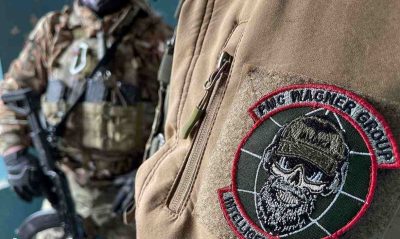West’s Predictions About Coup in Russia Proved Wrong

All Global Research articles can be read in 51 languages by activating the Translate Website button below the author’s name.
To receive Global Research’s Daily Newsletter (selected articles), click here.
Click the share button above to email/forward this article to your friends and colleagues. Follow us on Instagram and Twitter and subscribe to our Telegram Channel. Feel free to repost and share widely Global Research articles.
***
More and more, Western media outlets seem discredited due to their own propaganda acts. On June 24th, news around the world were marked by reports on the situation in Russia, due to a mutiny organized by the head of the Wagner Group PMC, Evgeny Prigozhin. A day earlier, the ex-restaurateur claimed to have started a “march for justice” to Moscow, with Wagner’s troops occupying military facilities in the city of Rostov. The objective would be to achieve changes in the Russian governmental structure, mainly in the Ministry of Defense, given the public disagreements between Prigozhin and Minister Sergey Shoigu. On the 23rd, Wagner’s head had also officially accused the Russian Army of bombing the PMC’s field camps in the special military operation zone.
With no effective damage to Russian society, the riot ended on the 24th, less than one day after it started. After talking with the President of Belarus Aleksandr Lukashenko, Prigozhin declared that he had reached an agreement, ordering the withdrawal of Wagner’s troops from the streets. In the agreement, it was established that Prigozhin would be moved to Belarus and that both he and the Wagner’s soldiers involved in the mutiny would be amnestied, without any criminal prosecution. In addition, Wagner’s troops who did not participate in the “march” were incorporated into the Ministry of Defense, becoming part of the Russian Armed Forces. No changes in the Ministry of Defense were mentioned in the agreement.
The existence of a deal made it clear that what happened was just a mutiny, not an attempted coup d’état or the start of civil war. If something so serious were attempted by Prigozhin, the situation would not be resolved so quickly with a simple agreement mediated by Lukashenko. Prigozhin would be arrested, and the Russian army would attack Wagner’s soldiers involved in the move. The way Russian forces deal with cases of treason is severe, so if there was an amnesty, it is because the case was seen as a mutiny, without major proportions and side effects.
However, the western media miscalculated what the outcome of the problems in Russia would be and hastily launched a series of baseless predictions about the future of the country and its president. The Financial Times, for example, published: “It is hard to believe that Putin can ultimately survive this kind of humiliation… His prestige, his power, even his life of him, are now on the line”. In the same vein, CNN stated that “Putin’s regime will ever go back to its previous heights of control from this moment… further turmoil and change is ahead”, even predicting that Wagner’s mobilization would “alter the course of the war in Kiev’s favor.”
In some cases, media outlets even promoted curious pro-Wagner propaganda, believing that the PMC would actually start a civil war against the Putin government – but these groups’ enthusiasm was obviously short-lived. For example, the pro-Kiev website “Terror Alarm” even referred to Wagner’s troops on their social networks as “freedom fighters” during the turmoil, but changed the narrative in a few hours, classifying them as “terrorists” after reporting the end of the riot.
Apparently, even Western officials misunderstood the case. The Wall Street Journal reported that sanctions against the Wagner Group have been postponed by US authorities in light of the “possibility” of an anti-Putin rebellion. Also, Politico published a series of erroneous predictions made by US officials about how Prigozhin’s maneuvers would “help” Ukraine. Government sources informed the newspaper that this would be “an unprecedented opportunity to advance”. In the same vein, Democratic Congressman Jason Crow said that the unrest would “almost certainly benefit the Ukrainian counteroffensive in the near term and [Kiev] should move fast to capitalize.”
However, in the end, Western outlets and officials were wrong, misled by their own propaganda machine. The mutiny lasted a few hours and had no positive effect for Ukraine either on the battlefield or in Russian civil society. On the contrary, Moscow emerged undoubtedly strengthened from the event. The Russian government, in cooperation with Union State partner Belarus, has shown itself able to resolve internal conflicts of interest through diplomacy, without generating large-scale problems. Furthermore, a series of strategic maneuvers were taken during the unrest, such as the establishment of an anti-terrorist operation, the mobilization of Chechen troops to Rostov and the transfer of Wagner’s soldiers involved in the “march” to the territory of Belarus.
Some analysts even suggested that the event was a kind of Russian “psyop” to distract the West while such strategic maneuvers were being made. Although there is not enough evidence to prove such a hypothesis, it is undeniable that there were significant gains, which are already starting to be seen even by the enemy side. On the 25th, for example, Poland began mobilizing troops on the border with Belarus, in response to the arrival of the Russian PMC in the neighboring country.
During Wagner’s “march”, there was no challenge to the authority of Vladimir Putin. Prigozhin never spoke of “overthrowing” Putin – despite calling him “mistaken”, directing his words only to the Ministry of Defense. Likewise, all sectors of Russian society, even those who agreed with Prigozhin in his claims, reaffirmed their loyalty to Putin.
*
Note to readers: Please click the share button above. Follow us on Instagram and Twitter and subscribe to our Telegram Channel. Feel free to repost and share widely Global Research articles.
Lucas Leiroz is a journalist, researcher at the Center for Geostrategic Studies, geopolitical consultant. You can follow Lucas on Twitter and Telegram.
Featured image is from InfoBrics

